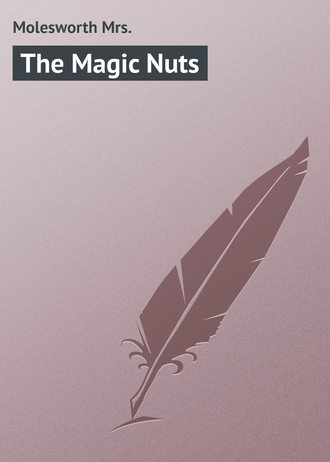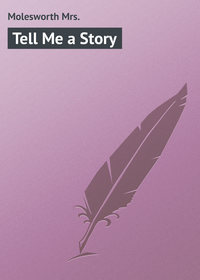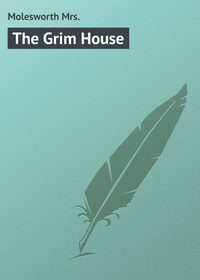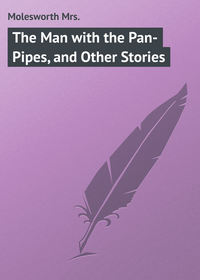
'Oh, Fraulein, dear,' said Leonore, 'how lazy I am! You are dressed, and I only woke up a few minutes ago.'
'All the better, my child,' was Fraulein's kind reply. 'It means, I hope, that you have slept well and soundly. My native air brings back old habits to me, you see. I was always accustomed to getting up very early here. And see, what a lovely day it is! As soon as we have had breakfast I must take you out to see the village and – '
'The Castle,' interrupted Leonore. 'Can't we go to the Castle? I do so want to know if Hildegarde has come. I have been – ' 'dreaming about her,' she was going to say, but something, she knew not what, made her hesitate and change the words into 'thinking of her – ' 'so much.'
Which was of course quite true.
And something of the same feeling prevented her looking for the nuts till Fraulein left the room.
'It is not likely that the little Baroness has already arrived,' her governess replied. 'We shall be sure to hear as soon as she comes. But we can see something of the Castle outside at any rate. For the next few days I think it must be all holiday-time,' she went on, smiling. 'Aunt Anna begs for it, and we have been working pretty steadily these last months.'
Leonore had no objection to this proposal, though she was fond of lessons, never having been over-dosed with them, and she jumped out of bed and bathed and dressed in the best of spirits. The nuts were quite safe in her jacket pocket. She wrapped them in a piece of paper for better security and put them back again.
'I should not like to lose them,' she thought. 'My dream has given me a feeling that there is something out of the common about them, and I should like to take them with me wherever I go. Just supposing I ever met any fairy sort of person, perhaps the nuts might turn out to be of use in some queer way.'
After breakfast, and when Fraulein had helped Leonore to arrange her books and work and other little things in the room that was to serve as her schoolroom during the winter, they set off on their first ramble through and round the village.
It was a pretty village – lying as it did at the foot of the hills, which were beautifully wooded, it could scarcely have been ugly. But besides these natural advantages, it was bright and clean; many of the houses, too, were pretty in themselves, with deep roofs and carved balconies, and in some cases many coloured designs painted on the outside walls. Leonore was delighted; it was so different from any place she had ever seen before.
'Oh, Fraulein,' she exclaimed, 'it's like a toy-town. It doesn't look as if real people had built it.'
'But it looks as if very real people had built that, does it not?' said Fraulein, stopping short and drawing Leonore a little backward.
'That' was the grim old Castle, of which they now had the first view, standing lonely and gray up on the heights overlooking the village, like a stern guardian keeping watch on the doings of playful children at his feet.
The little girl gazed at it with all her eyes.
'It's a real Castle,' she exclaimed; 'I am so pleased. It looks as if it had dungeons and – and – forti – What is the word, Fraulein?'
'Fortifications,' said her governess. 'You mean that it is fortified. Yes; at least it used to be in the old days. There are the holes in the walls which the defenders used to shoot through in time of siege, and there are battlements still quite perfect round the front. It is so pleasant to saunter on them, and think of the strange scenes the old place must have witnessed. We can walk up the hill towards the gates if you like, and you will see a little more.'
Leonore, of course, did like, and the nearer they got to the Castle the more was she fascinated by the view of the ancient building. Just outside the entrance they stood still, and Fraulein began pointing out to her its different parts and giving her a little historical account of it, to which she listened with interest. Suddenly – for all was very silent just then – they heard steps approaching and a clear young voice singing softly. And – Fraulein stopped talking and stood gazing before her, as did Leonore, till – from among the trees which bordered the short approach to the inner gateway, there appeared a childish figure, running towards them, singing as she came. A young girl, dressed all in white, with fair floating hair —
'It is Hildegarde,' said Leonore, growing pale with excitement. For the figure was exactly like the little girl in her dream!
CHAPTER IV
ON THE WAY
Oh, what is that country,And where can it be? – Rossetti.If Fraulein heard what Leonore said, she did not seem surprised, for though she did not, of course, know about the little girl's curious dream, she knew that Hildegarde's coming had been freely talked about the evening before. But she was very astonished a moment later when Hildegarde, looking up quietly, said with a smile —
'I have come to meet you. I was sure I should.'
'My dear child!' exclaimed Fraulein. 'How could you know? The fairies must have told you!'
The little stranger smiled again.
'This is Leonore,' she said, taking the other child's hand. 'Grandmamma told me her name, but grandmamma did not know I should meet you'; and she shook her head with a funny little air of mystery.
'It is wonderful,' said Fraulein; 'it is even wonderful that you should know me again. It is five years —five years– since you saw me last – half your life.'
'Yes,' said Hildegarde, 'but I can remember longer ago than that.'
She was still holding Leonore's hand, and though the little English girl felt rather shy, and had not yet spoken to her new friend, yet she liked the touch of the gentle fingers and pressed them in return, while she looked at Hildegarde's pretty fair face in admiration.
'I am coming soon to see Aunt Anna,' Hildegarde went on. 'Will you give her my love, Fraulein Elsa, and tell her so? May I come this afternoon?'
'Certainly, certainly,' said Fraulein; 'the sooner you and Leonore make friends, the better pleased we shall all be.'
At this Leonore took courage.
'Yes,' she said, looking earnestly at Hildegarde with her serious dark eyes. 'I want very much to be friends.'
'It will not take long,' said Hildegarde, and then, for the first time, Leonore noticed that the little girl's eyes were not like any she had ever seen before. They were not blue, as one would have expected from her light, almost flaxen hair and fair complexion, but a kind of bright hazel-brown – with lovely flashes, almost, as it were, of sunshine, coming and going.
'They are golden eyes,' thought Leonore; and when she repeated this to Fraulein afterwards, her governess agreed with her that she was right.
'I remember noticing their colour when she was a very tiny child,' said Fraulein, thinking to herself that the two little girls made a pretty contrast, for Leonore's hair was dark, as well as her eyes.
Hildegarde held up her face for Fraulein to kiss, and then she ran off again, saying as she did so —
'Do not forget to tell Aunt Anna I am coming, and perhaps she will make some of those dear little round cakes I love so – she knows which they are. Leonore will like them too, I am sure.'
The day was getting on by this time; it was past noon.
'We will just stroll to the other end of the village,' said Fraulein; 'from there we shall have the side view of the Castle – there is a short cut down to the street at that end, by some steps, but they are rough and in need of repair, so we generally prefer the longer way. The old Baron has spoken of shutting off the side entrance; he says it is only fit for goats to scramble up.'
Leonore thought, though she did not say so, that it would be very amusing for little girls all the same, and determined to ask Hildegarde about it. She thought the Castle even more interesting seen sideways than in front; it looked so very close to the thick dark trees behind, almost as if it touched them.
'I shall have lots of things to talk to Hildegarde about,' she said to herself. 'These woods are very fairy-looking. And I think I must tell her my strange dream about her and the nuts. I don't think she would laugh at it. I hope I have them quite safe.'
Yes, they lay snugly in her pocket, wrapped up in the piece of paper – a nice piece of pink paper that she had found among her things.
'I will leave them where they are,' she thought, 'and then I shall be sure to remember to tell Hildegarde my dream.'
It was nearly dinner-time when they got back to Aunt Anna's, for in that part of the world big people as well as little dine in the middle of the day. Aunt Anna was most interested in hearing of Hildegarde's arrival, and quite as delighted as Fraulein had been.
'And was it not strange that she should have come to meet us?' said Fraulein. 'She must have had a presentiment about it.'
'What is a presentiment?' asked Leonore.
'A sort of knowing beforehand about something that is going to happen,' answered Fraulein. 'Many people have the feeling, but very often it does not come true, and then it is not a real presentiment. It is not everybody that has real presentiments.'
Aunt Anna smiled. Leonore was learning to love her smiles. They reminded her of some other smile – whose was it? Hildegarde's? – yes, a little, perhaps, but no, she had seen Hildegarde for the first time that morning, and this feeling about Aunt Anna's smile had come to her already yesterday. Whose smile could it be?
'Hildegarde is a dear child,' said Aunt Anna, 'and perhaps she is one of the few who know more than the everyday people. And she was born at the Castle and spent her babyhood there. How well I remember the day she was christened!'
'Oh, do tell me,' exclaimed Leonore impulsively. 'Did they have a grand feast, and did they invite any fairies? Perhaps she had a fairy godmother.'
'Leonore!' said Fraulein, beginning to laugh. 'You are getting too fanciful – you really – '
'Nay, Elsa,' interrupted Aunt Anna. 'Let the child say out what is in her mind, and remember, we are here in our dear country, close on the borders of Fairyland – '
'Yes, Fraulein,' Leonore interrupted in her turn. 'You said so yourself.'
'And assuredly,' Aunt Anna went on, 'if Hildegarde has a fairy godmother, she has given her none but good gifts.'
'You speak as if such things were possible, my dear aunt,' said Fraulein. 'We must not let Leonore grow too fanciful. I shall have you and her taking flight in an airy chariot drawn by white swans or something of that kind some fine day, if I don't take care.'
'Well, you and Hildegarde can come after us in another chariot if we do,' said Aunt Anna, laughing.
But Leonore remained serious.
'Please tell me, Aunt Anna,' she said, 'as you were at Hildegarde's christening, was there any one there who might have been a fairy?'
Aunt Anna hesitated.
'There was an odd story,' she replied, 'about a beautiful lady who was met coming away from the nursery, when the baby had been left alone in her cot for a moment or two. And when the nurse went back she found her smiling and crowing and chuckling to herself as if she were six months instead of only a few days old, and in her little hand she was tightly clasping – '
'What?' asked Leonore breathlessly.
'Three nuts,' replied Aunt Anna impressively. 'Three common little brown hazel-nuts. That part of the story is true, for Hildegarde has the nuts to this day, I believe – at least she had them the last time she was here.'
'She must have picked them up somehow,' said Fraulein.
Aunt Anna shook her head.
'A baby of a few days old cannot pick things up,' she said. 'No, it has never been explained. None of the servants had put them into her hand – indeed they would not have been so foolish, and they could scarcely have had the chance of doing so. And it was said by the one or two who declared they had met her, that the beautiful lady was carrying a basket on her arm filled with common hazel-nuts, and some days afterwards one of the foresters said that late that same evening a little old woman whom he had never seen before stopped him up in the high woods to ask the way to some strange place of which he had never heard, and she – the little old woman – was carrying a basket of nuts. She offered him some, but he thought she was a witch and would not have any.'
'Dear me, Aunt Anna,' exclaimed her niece, 'I did not know all these wonderful tales. Surely they grew out of finding the nuts in the baby's hands. I do remember hearing that, though I had forgotten it.'
'Perhaps that was the origin of it all,' said her aunt quietly. 'Still, Hildegarde is an uncommon child. It certainly seems as if she had received some fairy gifts, however they came to her.'
Leonore did not speak, but she listened intently. She would probably have not contented herself with listening but for knowing that she was so soon to see Hildegarde herself again.
'She will be the best person to ask,' thought Leonore. 'I will tell her about my nuts and the little old woman who gave me them, and about the pretty laugh I heard in the wood, and then, I feel sure, she will tell me all she knows.'
She could scarcely finish her dinner, so eager and excited did she feel. And she was more than delighted when, at the close of the meal, kind Fraulein proposed to her that, as Hildegarde had come to meet them that morning, Leonore should show her new little friend the same attention.
'You can scarcely miss her,' she said. 'She is sure to come the same way that I took you this morning. If you get ready now, and start in a quarter of an hour or so, you will be about right, I should say. They dine early at the Castle. But I should like you to change your dress in case you should be presented to the Baroness – Hildegarde's grandmamma.'
Leonore ran off to get ready. She was not long about it, but all the same her new little friend must have been even quicker, for Leonore met her a very few steps only from Aunt Anna's gate. Hildegarde's face lighted up with a smile when she caught sight of the other little girl.
'So you have come to meet me,' she said; 'that is very nice of you. I hope I have not come too soon. Shall I go in now to see Aunt Anna?'
Leonore looked a little disappointed, which Hildegarde seemed at once to understand.
'I don't mean to stay with Aunt Anna,' she added quickly; 'what I want is for you and me to go out somewhere together. It is a lovely day, and I have leave to stay out till dusk. My grandmamma is going to pay some visits, so she hopes to see you some other day – perhaps to-morrow. I think we shall get to know each other far the best by being alone by ourselves – don't you think so?'
'Yes, certainly,' said Leonore, her face clearing. 'I am so glad you understand. I have such a lot of things to talk to you about.'
Hildegarde nodded her head. It was a little habit of hers to do so without speaking sometimes.
'Then we must not lose any of our time,' she said, after a moment's pause. 'But first I will run in to give Aunt Anna a kiss, and then we can go off somewhere together.'
Aunt Anna's face was full of pleasure at the sight of her little friend – the two were evidently old acquaintances.
'How well you are looking, my child,' she said, 'and how much you have grown! Let me see, which is the taller, you or our little Leonore,' and she drew the two children together. 'There is not a quarter of an inch between you,' she exclaimed. 'If you were ponies you would be a perfect match – one dark and one fair,' she added musingly. 'Yes, my dears, you are evidently intended to be friends.'
'And that is just what we mean to be,' said Hildegarde. 'May we go now, Aunt Anna? You will not be anxious even if Leonore does not come home till dark?'
'Oh no,' said the old lady tranquilly, 'I know you are as safe as you can be – you are going to the woods, I suppose?'
'I think so,' Hildegarde replied.
As soon as they found themselves out of doors again, she took Leonore's hand.
'Let us run quickly through the village,' she said, 'and then when we get inside the Castle grounds we can go slowly and talk as we go. Or perhaps we can sit down – it is so mild, and there are lots of cosy places among the trees.'
Leonore was quite pleased to do as Hildegarde proposed; indeed she had a curious feeling that whatever her new little friend wished she would like. She did not speak much, for it seemed to her as if she were meant in the first place to listen.
The woods were very lovely that afternoon. Hildegarde led the way round the Castle without approaching it quite closely, till they stood in a little clearing, from which they looked upwards into the rows of pine-trees, through which here and there the afternoon sunshine made streaks of light and brightness.
'Isn't it pretty here?' said Hildegarde. 'Hush – there's a squirrel – there are lots about here; they are so tame they like to be near the house, I think. Shall we sit down? It is quite dry.'
Leonore was not troubled with any fears of catching cold – and indeed the day was as mild as summer.
'Yes,' she said, 'it is a very pretty place. I have never seen such big woods before.'
'They go on for miles and miles – up ever so far,' said Hildegarde, 'though here and there the ground is quite flat for a bit. And over there,' she pointed to the left, 'they are not pine woods, but all sorts of other trees. I don't know which I like best.'
'Pine woods I should say,' Leonore replied. 'Perhaps because I have never seen such beautiful high fir-trees before. And the way the sun peeps through them is so pretty.'
As she spoke, half unconsciously her hand strayed to her jacket pocket. There lay safely the little packet containing the three nuts.
'Hildegarde,' she said, 'I heard the story about you when you were a baby, and what they found in your hand. And – it is very odd – do you know – no, of course you couldn't – but just fancy, I have three nuts too!'
Hildegarde nodded her head.
'I did know,' she said, smiling. 'And – look here.'
From the front of her frock she drew out a little green silk bag drawn in at the top with tiny white ribbon. She opened it carefully, and took out something which she held towards Leonore – on her pretty pink palm lay three nuts, common little brown nuts, just like Leonore's. And Leonore unwrapped her own packet and in the same way held out its contents.
'Yes,' said Hildegarde, 'it is all right. I knew you had them.'
Leonore stared at her in astonishment.
'How could you know?' she exclaimed.
'I suppose people would say I dreamt it,' Hildegarde replied, 'but I don't call it dreaming. I have always known things like that since I was a baby. And I knew that some day I should have a friend like you, and that together we should have lovely adventures, and now it is going to come true.'
Leonore grew rosy red with excitement.
'Do you mean,' she began, 'Hildegarde, can you mean that perhaps we are going to find the way to Fairyland? I have been thinking about it ever since I can remember anything.'
Hildegarde nodded.
'Yes,' she said, 'I am sure you have. But I don't quite know about Fairyland itself. I am not sure if any one ever gets quite there – into the very insidest part, you know. I almost think we should have to be turned into fairies for that, and then we never could be little girls again, you see. But I am sure we are going to see some wonderful things – there are the outside parts of Fairyland, you know.'
'Fraulein says all this country is on the borders of Fairyland,' said Leonore.
'Well, so it is, I daresay, for fairies do come about here sometimes. You've heard the story of the one that came to my christening feast?'
'Yes,' said Leonore, 'and I am beginning to think that I have seen her too,' and she went on to tell Hildegarde about the little old dame in the market-place at Alt who had given her the nuts, and about the mischievous laugh she had heard in the wood on the way to Dorf, and all her own thoughts and fancies, including her dream of Hildegarde herself.
Hildegarde listened attentively.
'I feel sure you are right,' she said, 'and that the dame was my own fairy, as I call her. And I believe the laugh you heard in the wood was when you were hoping you hadn't lost the last three nuts. I don't believe you could have lost them; if you had thrown them away they would have come back to you. Just think how my three have always been kept safe, even though I was only a tiny baby when they were put into my hand.'
Both little girls sat silent for a moment or two, gazing at the six brown nuts.
'And what do you think we are meant to do now?' asked Leonore at last.
'To do,' repeated Hildegarde in some surprise; 'why, of course it's quite plain – to crack the nuts! Not all of them at once – one, or perhaps two – one of yours and one of mine, I daresay.'
'Oh,' exclaimed Leonore, 'do you really think we should? How I wonder what we shall find! Just supposing there is nothing but a kernel inside.'
'There's no good in supposing it,' said Hildegarde; 'we shall soon see. As I have had the nuts the longest perhaps it's meant for me to crack one first – so – '
She put the nut between her teeth. Of course if it had been a common nut this would not have been a sensible thing to do, as she would probably have broken her teeth and not cracked the nut, but Hildegarde knew what she was about. The nut gave way with a touch, and in another moment the little girl had broken off enough of the shell to see what was inside, Leonore bending over her in breathless eagerness.
CHAPTER V
'WHAT'S O'CLOCK?'
'You had best come with me,' says he.… And so they did. —The Brown Bear.The first exclamation came from Leonore. It was one of disappointment.
'Oh, Hildegarde,' she cried, 'it is only a common kernel,' for nothing was to be seen but what looked just like the browny-gray skin of the inside of a nut.
'No,' Hildegarde replied, 'it isn't that at all'; and with her clever little fingers she carefully drew out what was in reality a small sheet of thin brown paper or tissue of some curious kind, rolled into a ball, and which, when she had carefully unfolded it, was shown to have a few lines of words stamped or impressed upon it in gilt letters.
These were the lines. I have translated them to give the exact meaning, though as rhymes they were prettier in the original language: —
Right behind the CastleIs hid a tiny door;This let thy comrade open —Nuts you still have four.Hildegarde smoothed it out and held it for Leonore to see.
'What can it mean?' Leonore asked breathlessly.
'First,' said Hildegarde, 'it means that you are to crack one of your nuts too. Don't you see – it says "thy comrade," and then "nuts you still have four." That shows that the "you" means us both together – four nuts between us. So please crack your one.'
Leonore did so between her teeth, as her friend had done, and quite as easily. This time there was no exclamation of disappointment, for the first glimpse of the contents showed something glittering, and with trembling eagerness the little girl, breaking away still more of the shell, drew out a little ball of very fine but firm gilt thread. This, by Hildegarde's advice, she gently untwined, till she came to something hard in the middle. It was a small, very small, gold key, hanging on the long gilt thread, which proved to be in a ring, with no knot or join to be seen.
Leonore, without speaking, glanced up at Hildegarde, who was earnestly examining their new discovery.
'"Right behind the Castle,"' Hildegarde murmured to herself. 'Let me see – yes, I think I know what it means. See, Leonore, "right behind" must be from the centre of the wall of the Castle yard down below us, I should say. It is easy to find, as there is a door just in the middle. Look, you can see it from here. Well, now, if one of us stands as near the middle as we can guess, holding the thread, and the other goes straight on, holding the thread too, as far as it will reach, and running the key on as she goes, then she would get to the place that I fancy is meant. The thread must be meant to be double, or it would not be in a ring.'









